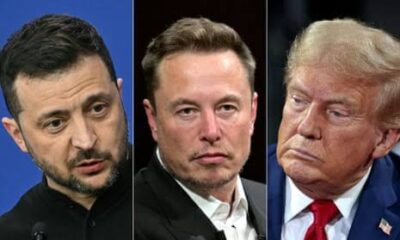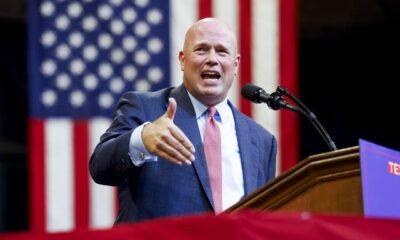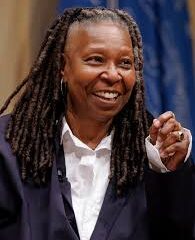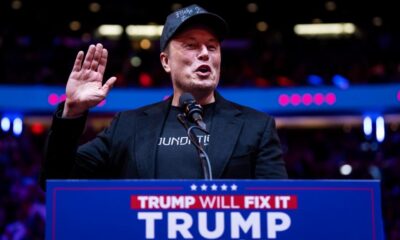NEWS
Trump claims Kim Jong Un ‘misses’ him. But he faces a very different North Korean leader this time around
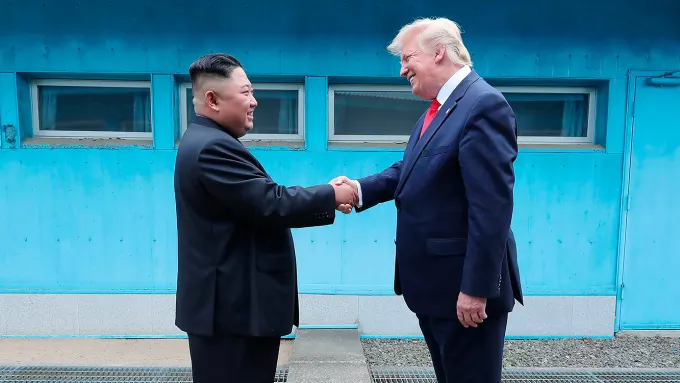
No United States leader has handled relations with North Korea quite like Donald Trump
The former president went from threatening Kim Jong Un with “fire and fury” if the North Korean leader continued testing missiles, to becoming his pen pal, meeting him in a series of unprecedented summits, and boasting that the two had fallen “in love.”
Now, that unlikely friendship will be put to the test. The former president is set to return to the White House at a moment of acute alarm among the US and its allies about Kim and the threat posed by his regime.
Pyongyang is believed to have sent thousands of troops and tons of munitions to Russia as Moscow wages war on Ukraine, in what Western leaders see as a major escalation. Days before Trump won the US presidential election, it lobbed another threat – testing an intercontinental ballistic missile with the range to strike anywhere in the United States.
On the campaign trail, Trump said Kim “misses” him and implied the country would not be “acting up” when he returns to office
But the second Trump administration will face an emboldened and arguably more dangerous North Korean leader
Kim – and potentially his arsenal – are now bolstered by burgeoning ties with Moscow, and he has hardened his stance toward the US and its ally South Korea after the failed diplomacy of the last Trump era.
That makes reaching an agreement between the two to rein in North Korea’s weapons program all the more challenging – and raises questions of whether Trump, known for his impulsive foreign policy, might seek to shift the goal posts on what the US wants to see from North Korea, experts say
A series of 2018-19 meetings between Trump and Kim in Singapore, Hanoi and the demilitarized zone between North and South Korea created unprecedented optics for both leaders
Then, the president of the world’s democratic superpower was pictured smiling and posing for photos alongside a typically isolated autocrat known for his ruthless rule over his people and drive to build sanctions-defying weapons as a means of preserving his regime.
For Trump, the meetings were a bid to accomplish what US presidents have repeatedly sought to do in other ways – curb Pyongyang’s rogue nuclear program. For Kim, they were both a chance to try to get relief from heavy international sanctions – and a rare opportunity to be granted such prestige on the world stage.
But talks ended without any breakthrough – with an abrupt ending to a 2019 summit in Hanoi amounting to what experts say was a huge loss of face for Kim.
Though the leaders met once more that year, Pyongyang has since refused to reengage with the US, experts say, and restarted weapons testing it had appeared to pause alongside that dialogue. While it has yet to initiate a nuclear test since 2017, Kim has recently vowed to increase the country’s number of nuclear weapons “exponentially.”
The circumstances in which we must deal with North Korea have changed fundamentally compared to five years ago,” said Rachel Minyoung Lee, a senior fellow at the Stimson Center think tank in Washington.
She pointed to the “higher price tag” on North Korea’s nuclear and missile programs due to further advancements since Hanoi, as well as North Korea’s “foreign policy reorientation” after the collapse of that summit “set off a fundamental skepticism within the North Korean leadership circle about the strategic value of the United States.”
Kim over the past year has raised international concern by breaking with decades of policy toward South Korea – classifying it as a “permanent enemy.” He’s called on his army to accelerate war preparations in response to “confrontation moves” by the US – actions that came as the Biden administration strengthened ties and increased military drills with South Korea and Japan.
And then there’s the deepening of ties with Russia. The North Korean leader has met with his “closest comrade” Russian President Vladimir Putin twice since last September and inked a major defense pact in June.
Western officials have also warned of what they see as an emerging anti-West ‘axis’ of China, North Korea and Iran with Russia – a trope that, whether actualized or not, is likely to be welcomed by Kim as he seeks to reduce isolation and gain international clout.
“From Kim’s point of view, he has a lot more to gain economically, militarily, and diplomatically by aligning (North Korea) with China and Russia than by reengaging with the United States when the returns are so uncertain,” said Lee.
Speaking to CNN during a World Knowlege Forum talk in Seoul in September ahead of the election, former Trump national security advisor Robert O’Brien said Trump would resume talks with North Korea if he returned to office.
But it was “unclear” how Kim would respond to new talks and if he would “get back to the pledge of denuclearization,” O’Brien said, referring to past pledges that never came to fruition. For the US, asking for anything less than denuclearization would be a “hard position” to take, he added.

